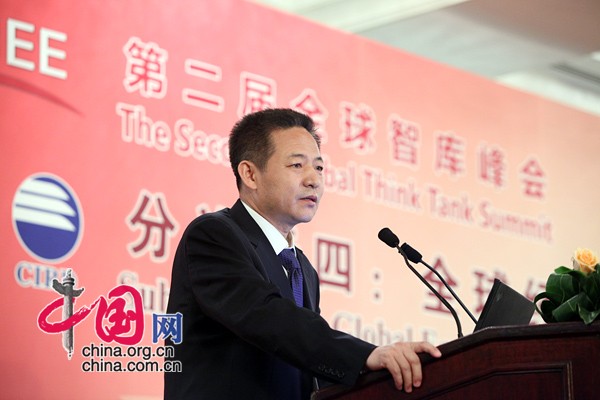SK and Japan no proxy for China to resist TPP
- By Pang Zhongying
 0 Comment(s)
0 Comment(s) Print
Print E-mail China.org.cn, June 23, 2012
E-mail China.org.cn, June 23, 2012
China, Japan and South Korea are about to launch talks on a free trade area (FTA). People who support the FTA thought that it can be a counterweight to the Trans-Pacific Strategic Economic Partnership (TPP) led by the United States.
South Korea has become the country with the largest number of free trade agreements before it decided to start trilateral FTA with China and Japan, especially after its free trade agreements with Europe and the U.S. came into force. In addition, it has a "10+1" free trade agreement with ASEAN. The country has taken on an active role in global economic competition due to the free trade agreement. In this circumstance, South Korea is in no rush to join the TPP or FTA with China and Japan.
|
|
|
Pang Zhongying, an International Relations professor at the School of International Studies, Renmin University of China. |
Unlike South Korea, Japan is at a disadvantage as it didn't have free trade agreement with Europe or the U.S. Besides, its agreement with ASEAN set up barriers on its agricultural sector. TPP did not originally include Japan. Although the Japanese government would like to join, it did not participate in the talks until November 2011 due to oppositions from many of its industries. Now, Japan is trying to increase their bargaining power in the TPP through talks with China on FTA.
TPP is not a general free trade agreement. Through this agreement the U.S. can not only open other countries' market during its economic recession, but also provide a sense of security to countries that doubt its ability to protect its allies during its recession. At the same time, it also helps to strengthen the strategic position of the U.S. in the Asia-Pacific region.
Many scholars pointed out that the TPP was positioned against China because of its exclusion of China. In fact, had it included China, its strategic function would not have existed.
In order to withstand the impact of TPP, one of the methods is to keep the Ah Q mentality (Ah Q is a fictional character created by modern Chinese writer Lu Xun to ridicule the ideology of psychological triumph), which is to have the mindset that TPP is nothing remarkable. Although it has decided to build a "high quality FTA," reality may deviate from its original design. However, a huge economic entity such as Japan joining the negotiation of TPP makes the establishment a force to be reckoned with, and China should not underestimate it. So the way of psychological triumph won't work.
The question then becomes how China could resist the TPP in the premise of not joining it? Some people think that trilateral FTA of China, Japan and South Korea can compete with it.
However, Japan and South Korea are first class allies of the U.S. and undertake the most important strategic mission in the Asia-Pacific region. For the two countries, they want to strengthen their influence in the Chinese market by establishing the FTA rather than resist TPP.
Japan and South Korea has taken two magnificent advantages in China for a long time. Firstly, they exported a large amount of products to China while restricted import from China. Between the trade with Japan and with South Korea, China has always faced trade deficits. Secondly, in the past 20 to 30 years, Japan and South Korea have turned China into their main production base. In this circumstance, China would not get much advantage from the FTA and can only cut the deficit by exporting products to Japan and South Korea that have been produced in China by Japanese and South Korean companies.
China cannot change its role as a manufacturing base by reaching the FTA. China, Japan and South Korea have signed a trilateral agreement on investment protection, so it can be expected that in the near future, China's investment in Japan and South Korea will not be able to compare with the two countries' investments in China, in both quantity and quality. The capital they invested in China was their profit in the Chinese market as their profit was tremendous. However, as China has only just started investing in Japan and South Korea, it could only use the capital that has been accumulated in China in the past.
Under the FTA, Japan and South Korea won't accept more Chinese laborers to work in their countries. Besides, they won't change the immigration policies. In addition, China won't put forward that Japan and South Korea use Chinese labors since they face issues of labor shortages and aging population.
Japan and South Korea can strengthen their two advantages through FTA: They lead the Chinese market through business and investment and add bargaining leverages against competitors. This is the main concern of the U.S. about the FTA, more so than any pressure China could bring against the TPP.
The author is an International Relations professor at the School of International Studies, Renmin University of China.
(This article was first published in Chinese and translated by Lu Na.)
Opinion articles reflect the views of their authors, not necessarily those of China.org.cn







Go to Forum >>0 Comment(s)